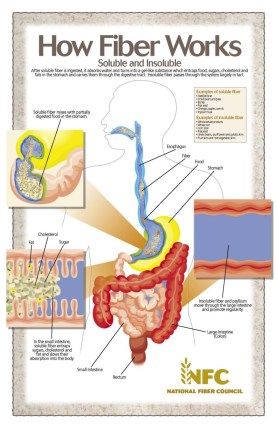When it comes to maintaining a healthy digestive system, one cannot overlook the importance of consuming an adequate amount of fiber. Fiber, also known as roughage or bulk, is a type of carbohydrate found in plant-based foods that our body cannot digest fully. While it may not be broken down like other nutrients, fiber plays a crucial role in promoting regular bowel movements and overall gut health.
What is fiber?
Fiber is the indigestible part of plant foods that passes relatively unchanged through our digestive system. It is classified into two categories: soluble fiber and insoluble fiber.
Soluble Fiber
Soluble fiber dissolves in water and forms a gel-like substance in our intestines. This type of fiber can help regulate blood sugar levels and lower cholesterol levels. Good sources of soluble fiber include oats, beans, lentils, fruits, and vegetables.
Insoluble Fiber
Insoluble fiber does not dissolve in water and adds bulk to the stool, aiding in the prevention of constipation and maintaining regular bowel movements. Foods rich in insoluble fiber include whole grains, nuts, seeds, and certain vegetables like broccoli and cabbage.
Why is fiber important for digestive health?
Fiber plays a crucial role in maintaining a healthy digestive system. Here are some reasons why fiber is important:
Promotes regular bowel movements
Fiber adds bulk to the stools, making them softer and easier to pass. By promoting regular bowel movements, fiber helps prevent constipation and the discomfort associated with it.
Prevents and treats hemorrhoids
By preventing constipation, fiber reduces the risk of developing hemorrhoids (swollen and inflamed veins in the rectum and anus) and helps alleviate the symptoms if they occur.
Supports weight management
Foods rich in fiber are more filling, leading to a reduced overall calorie intake. This can help with weight management and prevent overeating.
Controls blood sugar levels
Soluble fiber slows down the absorption of sugar and helps control blood glucose levels. This is particularly beneficial for individuals with diabetes.
Keeps the gut healthy
Fiber acts as a prebiotic, which means it provides nourishment for the beneficial bacteria in our gut. By promoting the growth of these healthy gut bacteria, fiber helps maintain a balanced gut microbiome, supporting optimal digestive health.
How much fiber do we need?
The recommended daily intake of fiber varies depending on age and gender. The general guideline is as follows:
Adult men (under 50 years old) – 38 grams
Adult men (over 50 years old) – 30 grams
Adult women (under 50 years old) – 25 grams
Adult women (over 50 years old) – 21 grams
It is important to gradually increase fiber intake and drink plenty of water to prevent any digestive discomfort.
Tips for increasing fiber intake
If your current diet lacks sufficient fiber, here are some tips to increase your fiber intake:
Choose whole grains
Replace refined grains with whole grains such as whole wheat, brown rice, quinoa, and oats. Whole grain products contain more fiber than their refined counterparts.
Include fruits and vegetables
Make sure to include a variety of fruits and vegetables in your diet. These are excellent sources of both soluble and insoluble fiber.
Incorporate legumes and beans
Add legumes and beans like lentils, chickpeas, and black beans to your meals. They are rich in fiber and add a nutritious punch to your diet.
Snack on nuts and seeds
Almonds, walnuts, chia seeds, and flaxseeds are great sources of fiber. Snack on a handful of nuts or sprinkle some seeds on your yogurt or salads for an extra fiber boost.
Read food labels
When grocery shopping, read food labels and choose products that are high in fiber. Aim for foods with at least 3 grams of fiber per serving.
Conclusion
Fiber is a vital component of a healthy diet and plays an essential role in maintaining a healthy digestive system. By including a variety of fiber-rich foods in our daily meals, we can support regular bowel movements, prevent digestive issues, and promote overall gut health. So, make sure to prioritize fiber when planning your meals and enjoy the benefits it brings to your digestive health!






